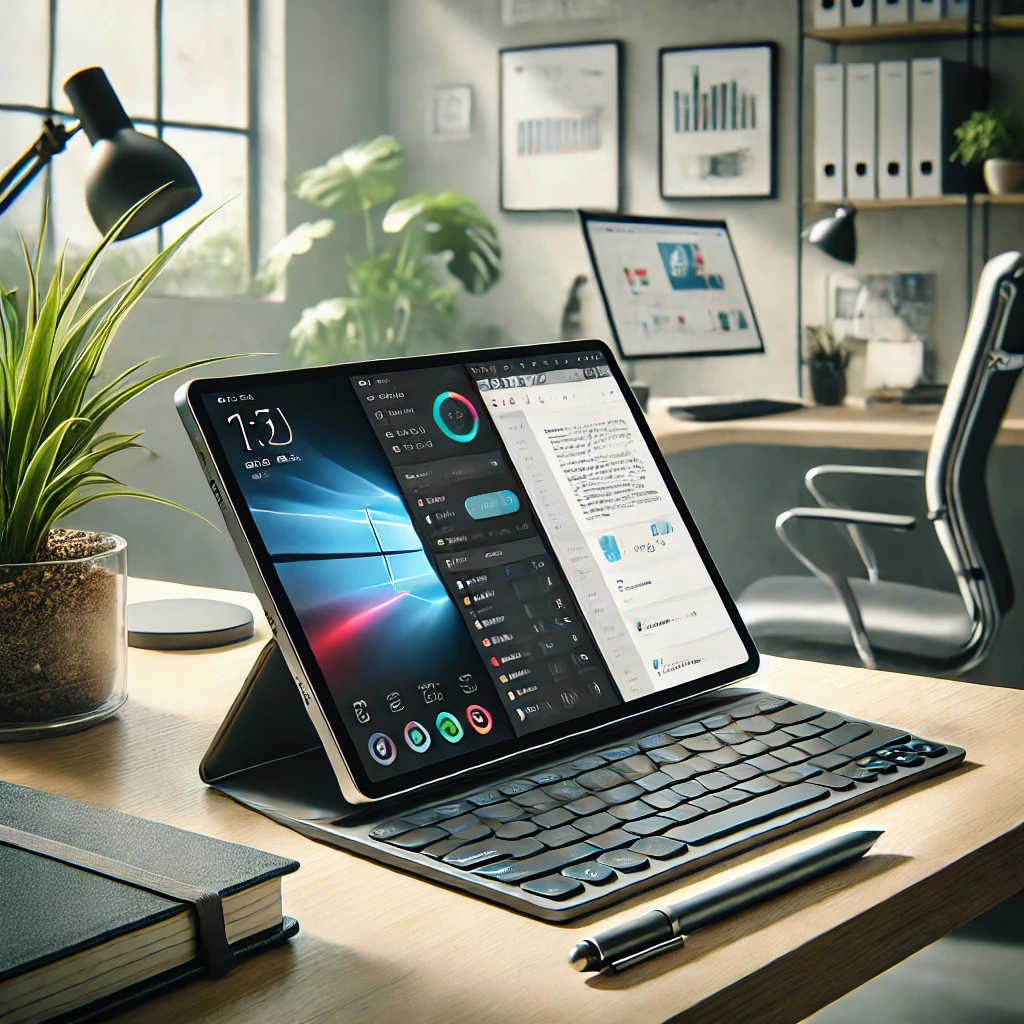Table Of Contents
Exploring the Pros and Cons of Using Tablets for Productivity
Key Takeaways
- Benefits of tablets for efficiency and effectiveness
- Drawbacks of tablets for productivity challenges
- Evaluating tablets against alternative gadgets
- Optimal situations for utilizing tablets
- Boosting efficiency with tablet features
The Pros And Cons Of Using Tablets For Productivity | Advantages of Tablets for Productivity
Tablets offer a unique blend of portability and convenience that appeals to many users, enhancing productivity on the go. The Pros and Cons of using Tablets for Productivity highlight how tablet devices, such as iPads or Android tablets, can easily be carried in a bag and used anywhere, making them a great alternative to bulkier laptops or desktops. Their user-friendly interfaces allow for quick access to apps and tools, streamlining tasks and communication. Many people find that tablet computers work well for everyday activities, from checking emails to basic document editing. This accessibility enables users to maximize their productivity, particularly when paired with their smartphones for seamless connectivity.
- Tablets are lightweight and easy to carry, promoting mobility.
- The intuitive touch screen interface is simple to navigate for quick tasks.
- Long battery life allows for extended use without frequent recharging.
- A wide range of productivity apps is available, catering to various needs.
- Many tablets support stylus input, enhancing note-taking and design work.
- Tablets can easily connect to other devices and peripherals, improving workflow.
- They offer various modes (like split-screen) for multitasking efficiently.
The Pros and Cons of using Tablets for Productivity | Portability and Convenience
Tablets offer unparalleled portability and convenience, making them a favored option for many users exploring the pros and cons of using tablets for productivity. The lightweight design of devices like the original iPad and the Apple iPad Mini allows for easy transport, enabling users to work from virtually anywhere. The nimbleness of tablets often surpasses that of laptops, especially when tasks require quick access to mobile apps or utilization of a stylus for drawing or note-taking. This flexibility enhances productivity on the go without the burden of a larger storage device.
The integration of advanced mobile technology has led to powerful processors in modern tablets, bridging the gap between traditional computing and mobile versatility. While some may question whether tablets can truly replace laptops for demanding tasks, it cannot be denied that their compact form factor and intuitive interfaces make them a compelling choice. Understanding the pros and cons of using tablets for productivity highlights how their convenience allows users to maximize time and creativity in various environments.
UserFriendly Interfaces
Tablets are designed with user-friendly interfaces that make them accessible for people of all skill levels. Unlike traditional computers, the touch screen display technology allows for intuitive navigation, making tasks simpler and quicker. Their hardware is optimized for seamless interaction, appealing particularly to those who prefer the simplicity found in mobile devices and phones. This ease of use contributes to the growing trend of media consumption on tablets, as users can easily switch between apps and content without complex setups.
The Pros and Cons of using Tablets for Productivity highlight the advantages of the streamlined interfaces that many tablet applications offer. These devices often have processors specifically tailored for efficient performance in daily activities. Unlike desktop computers, the simplicity of tablets encourages users to focus on content consumption rather than grappling with complicated software. For many, this leads to improved efficiency in both personal and professional contexts, showcasing the benefits of incorporating tablets into one’s productivity toolkit.
Disadvantages of Tablets for Productivity
The Pros and Cons of using Tablets for Productivity reveal several notable drawbacks, particularly regarding limited software capabilities. Many productivity apps available on tablets may not offer the full functionality found on laptops, which can hinder users who require advanced features for their tasks. Storage options can also be limited, as many tablets come with less capacity compared to traditional laptops. This can be inconvenient for users who need to store large files or databases. Battery life can vary significantly, and while some tablets perform well, others can struggle to keep up under heavy use. Competing with smartphones and laptops, tablets often present a higher cost for equivalent performance, especially with brands like Apple’s premium offerings, which may not always justify the expense for users focused solely on productivity.
Limited Software Capabilities
Many tablet owners find that while these devices are excellent for casual tasks, their software capabilities can fall short for more demanding productivity needs. The tablet industry has made significant strides in improving productivity apps, yet many tablets still struggle with robust applications commonly available on laptops and desktops. This limitation can hinder users who require specialized software to meet their various productivity needs, dampening the tablet advantage in professional environments.
Despite the growth in tablet sales, the limitations in software capabilities remain a common concern among users. The pros and cons of using tablets for productivity reveal that while these devices are portable and convenient, they may not support every application needed for intensive work. For professionals relying on advanced software tools, using tablets can sometimes lead to frustration and inefficiency, underscoring the importance of weighing The Pros and Cons of using Tablets for Productivity before making a commitment.
- Limited compatibility with specialized software applications
- Reduced performance for multitasking compared to laptops
- Difficulty in performing complex tasks that require extensive processing power
- Lack of support for certain industry-standard software programs
- Inconvenience of using touchscreen interfaces for tasks requiring precision
- Need for external accessories to enhance functionality, such as keyboards or styluses
- Potential software updates lagging behind those available for traditional computers
Ergonomics and Comfort Issues
Using a tablet can sometimes present challenges regarding ergonomics and comfort. Users often find that the lightweight and portable design may not provide the best posture during extended use. While a higher-end tablet model might offer enhanced performance, holding such devices for long periods can lead to discomfort. As tablet deployments become common in various fields, addressing these ergonomic issues is crucial for maintaining productivity levels. The big tablet market continues to evolve, emphasizing the need to consider how these devices align with users’ productivity needs.
Tablets typically feature smaller screens compared to laptops and desktops, which can strain eyesight and neck posture during long sessions. Tablet prices can vary widely, and while some devices are affordable, investing in ergonomic accessories can enhance comfort significantly. The pros and cons of using tablets for productivity ultimately hinge on balancing portability with physical well-being. Smart positioning of the device and appropriate breaks can mitigate these concerns, ensuring users get the most out of their tablets without sacrificing comfort.
Comparing Tablets to Other Devices
Tablets present an interesting alternative to traditional devices like laptops and desktops, showcasing both strengths and weaknesses. The obvious advantage tablets offer is their portability, making them suitable for individuals with specific productivity needs tied to mobility. Many productivity tasks can be effectively managed on a reliable tablet, particularly with the right applications. However, one must consider factors such as the longevity of tablet batteries and the necessity of a quality tablet case for protection and comfort during extended use. Evaluating the pros and cons of using tablets for productivity helps users make informed decisions that align with their personal work productivity levels and requirements.

Tablets vs. Laptops
Tablets offer a unique flexibility that makes them appealing for various productivity tasks. With diverse tablet screen sizes and lightweight designs, they can provide a high level of portability. Many users appreciate the tablet focus for everyday tasks, especially when paired with accessories tablets like keyboards or styluses. Windows-based tablets bring a familiar interface for those transitioning from traditional laptops, enhancing productivity without losing functionality. The Pros and Cons of using Tablets for Productivity become evident when considering the balance between convenience and power.
Laptops still dominate when it comes to software capabilities and performance. Many professional applications run more smoothly on laptops due to their superior hardware specifications. While an inexpensive Android tablet might serve basic purposes well, demanding tasks may require the robust features of windows tablets. For users who prioritize multitasking or heavy-duty applications, laptops offer a more comprehensive solution. The Pros and Cons of using Tablets for Productivity highlight these distinctions, guiding users in making informed decisions.
Tablets vs. Desktops
The humble tablet offers a lightweight alternative to traditional desktops, appealing to users seeking portability. With their super-fast tablet capabilities, these devices cater to casual tasks and content consumption. While general-use laptops remain a staple for heavy-duty work, the next-gen iPad and similar models provide impressive performance for many productivity tasks. However, understanding the pros and cons of using tablets for productivity is essential for making an informed decision on which device aligns with your specific needs.
Desktop computers excel in software compatibility and multitasking abilities, serving as powerful tools for demanding applications. While iPad apps continue to expand functionality, some users may find limitations when compared to the robust desktop software available. Despite this, the iPad alternatives can still enhance productivity, especially for users who prioritize mobility and ease of use over extensive processing power. Balancing these factors can help users determine the best device for their workflow.
Ideal Scenarios for Tablet Use
Understanding the ideal scenarios for tablet use requires evaluating The Pros and Cons of using Tablets for Productivity. Tablets excel in productive work uses that demand portability, such as during travel or meetings. The lightweight design of devices like the new iPad enhances convenience, making it easier to manage tasks on the go. App usage on tablets provides a wide variety of tools tailored for different purposes, from note-taking to graphic design. While they may not be suited for processor-intense activities like video editing, their stylus support allows for seamless creative tasks. These characteristics position tablets as effective business technology for professionals needing flexibility. Addressing important technology questions about their capabilities can help determine their role alongside traditional business devices like laptops and desktops.

OntheGo Productivity
Tablets have emerged as highly versatile devices for those seeking on-the-go productivity. The Pros and Cons of using Tablets for Productivity highlight their portability compared to general laptops and high-end laptops. Users can easily carry tablets in bags or backpacks, making them a convenient work device. While laptops and desktops offer better hardware capabilities for extensive tasks, tablets have bridged the gap for many casual users who prioritize mobility and ease of use.
New technology has allowed tablets to evolve, often incorporating features found in popular products like Apple products. These devices support a range of applications that facilitate work tasks, from email management to document editing. This efficiency makes them suitable for quick tasks while commuting or during travel. For some users, the simplicity and lightweight design of tablets might outweigh the limitations found in traditional laptops and desktops, thereby enhancing their on-the-go productivity experience.
Creative Tasks and Design
Tablets have become increasingly popular among creatives due to their versatility and ease of use. The Pros and Cons of using Tablets for Productivity highlight the strengths of these devices, particularly for design tasks. With powerful apps available on platforms like CNET iPad coverage, users can leverage business-related apps that take full advantage of the iPad’s intuitive interface. While conventional devices like laptops may offer better processor speeds, the convenience of having a lightweight tablet can outweigh these limitations during the creative process.
For artists and designers, tablets provide a unique opportunity to express creativity through touch and stylus input. The Pros and Cons of using Tablets for Productivity reveal that many professionals prefer using iPads for sketching and graphic design, as they can work directly with their digital canvas, using the iPad hands-on. Although laptop batteries often outlast those of tablets, the accessibility and portability of tablets make them an attractive option for those who need to work on the go.
Enhancing Productivity with Tablets
Tablets can significantly enhance productivity, especially when utilizing useful tools specifically designed for mobile device use. The Pros and Cons of using Tablets for Productivity reveal that while there are notable advantages, such as portability and convenience, users should remain aware of the cons, including limited software capabilities. Many business applications are optimized for tablet use, making them an attractive alternative to traditional corporate laptops. The cellular version of tablets offers flexibility, allowing tasks to be completed anywhere without reliance on Wi-Fi. However, one must consider the storage capability compared to conventional computers, as this can impact workflow efficiency. Ultimately, current devices bridge the gap between the need for mobility and the functionality expected in productivity tools.
Recommended Apps and Tools
Selecting the right apps can significantly enhance the productivity of a tablet. Many applications are specifically designed to maximize efficiency for everyday tasks, allowing users to experience the full effects of a tablet’s capabilities. While tablets offer considerable benefits, their processor speed limitations and limited hardware capabilities can restrict performance. Users can often circumvent these drawbacks by utilizing multiple apps that are lightweight and optimized for tablet use, making the most of the device’s available storage capacity.
For tasks that require more robust features, cloud-based applications can provide excellent solutions. These tools often allow users to free up local storage, utilizing remote servers instead. This approach helps mitigate the constraints associated with physical storage and enhances collaboration through easy sharing and access. By strategically choosing applications tailored for tablet functionality, users can navigate The Pros and Cons of using Tablets for Productivity effectively, ensuring a more seamless work experience.
| App Name | Category | Key Features |
|---|---|---|
| Notion | Productivity | Note-taking, Task Management, Collaboration Tools |
| Microsoft OneNote | Note-taking | Organized Notebooks, Cloud Sync, Collaboration |
| Google Drive | Cloud Storage | File Sharing, Document Editing, Collaboration |
| Trello | Project Management | Boards, Lists, Task Assignments, Collaboration |
Conclusion
The Pros and Cons of using Tablets for Productivity highlight the unique balance of benefits and drawbacks associated with tablet use. Users appreciate the portability and convenience of tablets, making it easier to complete tasks on the go. However, limitations in software capabilities and comfort may hinder productivity in certain scenarios. Cost can also play a role, as investing in a tablet may or may not align with the user’s specific needs. Understanding The Pros and Cons of using Tablets for Productivity allows users to make informed decisions about whether tablets are the right tool for their productivity requirements.
FAQS
How does a cellular tablet compare to laptops and desktops when it comes to increased productivity and using mobile apps?
The cellular tablet often serves as a versatile option for users looking to enhance their productivity. Unlike traditional laptops or desktops, a tablet varies in features and can seamlessly run mobile apps, which helps in maximizing efficiency. While consumption devices like tablets are excellent for multimedia experiences, they can also fill the need for productivity tasks, provided they are equipped with the right applications. Ultimately, the benefits of using a tablet to increase productivity can be substantial, depending on the specific tasks at hand and how well the user adapts to leveraging its unique features.
What are the advantages of using tablets with productivity features over traditional laptops and desktops when increasing productivity with mobile apps?
Tablets offer several benefits that can lead to increased productivity, especially when it comes to mobile apps. The tablet fill and various tablet features enable seamless multitasking and portability, making it easier to work on-the-go compared to traditional laptops or desktops. Additionally, the integration of mobile phones with productivity tasks allows users to access full-effects of apps that enhance their workflow, ensuring that professionals can maximize their efficiency and effectively utilize the benefits of mobile applications.
What are the potential benefits of choosing tablets over laptops and desktops for enhancing productivity with mobile apps?
Choosing tablets over laptops and desktops can provide several benefits when it comes to using mobile apps for increasing productivity. Tablets often offer a more portable design compared to laptops and desktops, making it easier to work on the go. Additionally, many tablets have optimized apps specifically designed to improve efficiency and multitasking capabilities. This can significantly enhance the user experience and lead to a more streamlined workflow compared to traditional laptops and desktops.
How can integrating tablets into your workflow improve the benefit of using mobile apps compared to laptops and desktops?
Integrating tablets into your workflow can significantly enhance the benefit of using mobile apps, leading to an increase in productivity compared to traditional laptops and desktops. Tablets often provide a more portable and user-friendly interface, which allows for quick access to mobile apps, enabling users to accomplish tasks efficiently while on the go.
What are the key differences in the benefit of using mobile apps on tablets versus laptops and desktops to increase productivity?
The key differences between using mobile apps on tablets and laptops/desktops primarily focus on portability and ease of use. Tablets offer a unique benefit in their lightweight design, allowing for greater flexibility in how and where you work. Conversely, while laptops and desktops provide more powerful hardware for intensive tasks, the streamlined interface of mobile apps on tablets can often lead to increased productivity due to their natural integration into casual environments.
What are some challenges faced when using mobile apps on tablets compared to laptops and desktops to increase productivity?
The challenges of using mobile apps on tablets versus laptops and desktops can include limited screen size, which may hinder multitasking, and reduced processing power that can impact the performance of certain mobile apps. Despite these drawbacks, tablets can still provide a unique benefit in terms of portability and convenience, enhancing productivity in many scenarios, especially when working on-the-go, compared to traditional laptops and desktops.
What unique benefits can users expect from utilizing mobile apps on tablets instead of laptops or desktops to enhance productivity?
Users can experience several unique benefits from utilizing mobile apps on tablets compared to laptops and desktops. Firstly, tablets are often more portable, allowing for greater flexibility and convenience in various environments. Additionally, touch screens on tablets can facilitate quicker interaction with apps, which can lead to more efficient workflow. Finally, the design of many mobile apps is optimized specifically for tablet use, further enhancing their effectiveness and overall benefit in increasing productivity when compared to traditional laptops and desktops.
What unique features do modern tablets offer that enhance the benefit of using mobile apps for increased productivity compared to laptops and desktops?
Modern tablets come equipped with touchscreens, portability, and built-in applications that significantly enhance their capability for using mobile apps, leading to a notable benefit in increasing productivity. These features often provide a more intuitive and efficient experience than traditional laptops and desktops.
What innovative ways can tablets enhance the benefit of using mobile apps to increase productivity compared to laptops and desktops?
Tablets can enhance the benefit of using mobile apps to increase productivity through their portability, touchscreen interfaces, and long battery life, which provide considerable advantages over laptops and desktops. Additionally, the seamless integration of various productivity applications on tablets can further improve workflow efficiency.
What considerations should users keep in mind when choosing between tablets and laptops/desktops to maximize the benefit of using mobile apps for increase productivity?
When deciding between tablets and laptops/desktops, users should consider factors such as portability, battery life, and ease of use, as these can significantly impact their ability to effectively utilize mobile apps and ultimately benefit from increased productivity. Laptops and desktops often offer more powerful performance capabilities, but tablets provide greater flexibility and convenience for on-the-go tasks.

